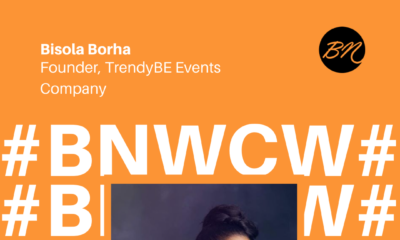Features
Ulari Nwaogazie: Can Your Corporate Event Be Foolproof? 10 Tips on How to Plan an Event with Minimal Stress
 Planning a corporate event can have even the most organised person tearing your down and shouting at even their own shadow! But, hey! You have been selected to either lead or be in a team of persons planning your company’s next end of year party, awards banquet, partner’s dinner etc. You’re sweating out and desperately looking for ideas or solutions on how to ensure that the event has minimal hitches and last minute surprises. Here’s a few help to get you going smoothly and coming out successful.
Planning a corporate event can have even the most organised person tearing your down and shouting at even their own shadow! But, hey! You have been selected to either lead or be in a team of persons planning your company’s next end of year party, awards banquet, partner’s dinner etc. You’re sweating out and desperately looking for ideas or solutions on how to ensure that the event has minimal hitches and last minute surprises. Here’s a few help to get you going smoothly and coming out successful.
Create a DASHBOARD of your initial thoughts
Your initial thoughts about this event should be laid out on how you want the event to look and feel. In this case you would need to outline the following; what you hope to accomplish, this would include specific goals or outcomes that you expect to see at the end of the event. Quite importantly, you would need to bear in mind that ultimately your company should come out having more goodwill, people should think more favourably and positively towards your company. This event should also grow your company’s cliental, creating new and strengthen existing relationships with employers and clients.
Set, READY, go!
Once you have created a dashboard of your thoughts and initial ideas, you then proceed with the planning of the event.
Create a CHECKLIST
This checklist should provide a step- by – step guide to organising and executing your event
Develop a BUDGET
The budget will be your financial roadmap for the event. It should be specific spelling out the expenses such as printing, adverts (where required), speakers, food, venue, host, supplies, decoration, security (where required). The budget should also include revenue opportunities such as sponsorship, ticket sales, donations, advert placements etc. It is very crucial to keep a good record, keeping track of all income and expenses. You can have a dedicated notebook, an MS Excel sheet. When creating a budget, do not forget to make provision for the miscellaneous expenses. This helps to cover for unexpected and or extra expenses which will definitely come up.
Reserve a VENUE
In real estate, one phrase is key, Location! Location! Location! Well, this is same for planning an event. Location is definitely everything! Your chosen location can make or mar your event. There are several factors that would influence your choice for a location such as your budget, purpose of event and activities you plan to carry out during this event. There are critical factors to also put into consideration such as the room capacity, is your event an outdoor or indoor event, are there any special needs for ramps or elevators. Will you need a podium, stage or any special and heavy equipment(s)? The number of tables and chair required plates, cutleries and glass cups.
What are you SERVING?
At this point you would decide what type of food or snacks you will serve at the event. Is the event a dinner, buffet or cocktail type of event? What sort of drinks will be available? Will you be serving alcoholic drinks? The drinks you plan to serve will require that you also ensure that the right type of glasses are available for each type of drink; wine glasses for wine, champagne (flute) glasses for champagne, right glasses for water and Cognac drinks as well.
Designing your PUBLICITY
When the publicity of an event is not done correctly you may end up with an unsuccessful event. For example, the targeted number or type of guest needed may not show up. Good publicity is critical towards succeeding at the event. There various methods you can use to market the event, and get the word out on the street. (The right street now, I mean). At the DASHBOARD phase, you would have made a list of guest, so this phase required you to design the best means of reaching to your guest. You can supplement any paid adverts by sharing some fliers, handouts, email messages, bulk sms and word- of – mouth.
Getting a SPEAKER/ ENTERTAINER
You would need to consider some of these points when enlisting for a speaker, entertainer/ facilitator for the event:Does the speaker appeal to broad segment of your audience? Who is the speaker? The number of expected guests, are there any technical requirements for their presentations. Does the speaker, entertainer require hotel and transportation arrangements? Remember to notify them of your interest to have them play a role at your event quite well in advance.
SOUVENIRS
It is nice to give a little gift to say “thanks for coming”. Although this can pose another dilemma when planning for your event. This aspect of planning is important because for the host you have something to share so that guest will remember the event for a long time. While for the guest, the items will serve as a symbol of their participation in the event. The theme for the event, persons attending, and the purpose of the event will determine the type of souvenirs to share. These could be mugs, pens, t-shirts, bags. For example, quotes relating to the key lessons learnt from the event can be printed on the Mugs, T-shirts etc.
Where to PARK
This is one aspect of planning an event that most people seem to ignore. The length of time, and the ease with which a guest parks at your event goes to long way to build up their emotions positively or negatively. It is nice to make provisions for parking, especially if you are expecting a large number of people. The parking amongst other should be accessible to the location of the event. Designated persons should politely guide on where and how to park. If you are making use of delivery trucks or vans, caterers, special equipments being delivered to the venue etc. You will need to ensure that all the parties know where best or authorised to unload.
EVALUATE the event
You and your team have done all the hardwork, pulled out all strategies and overcome several challenges. At this point, it is important to evaluate the event. One of the ways this can be achieved is to collect feedback from participants. You can create an evaluation form and handout (and if possible collect at the end of the event). To encourage participation your evaluation forms should be anonymous and short. Once the event is over, it is now time to sit, relax and reflect on the event. Good points scored should be noted for future use and things that did not go well should be reviewed and amended for the better. Reflecting on the event helps to improve upon the event in the future.
Photo Credit: Dreamstime | Fernandes Borges Michel


















